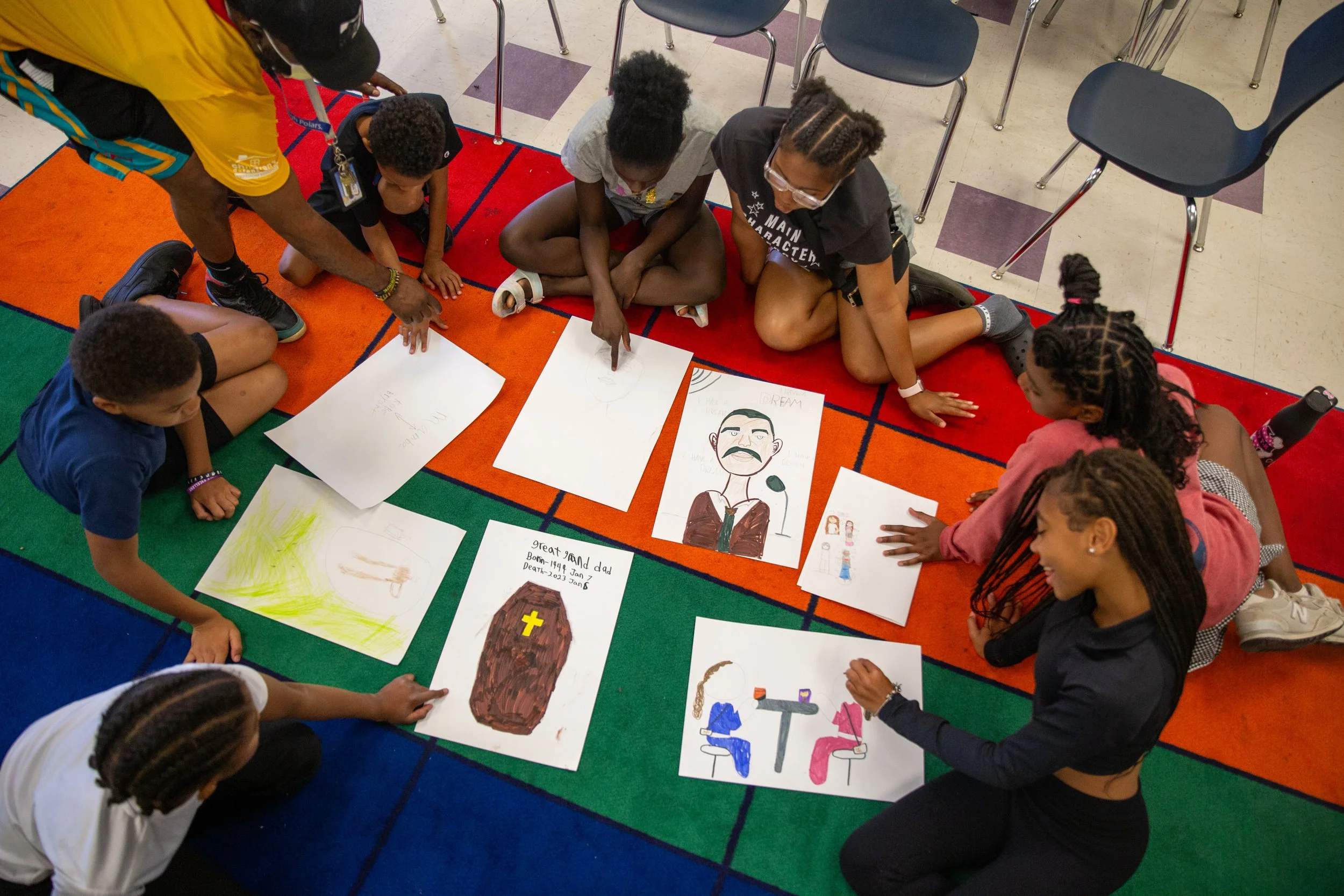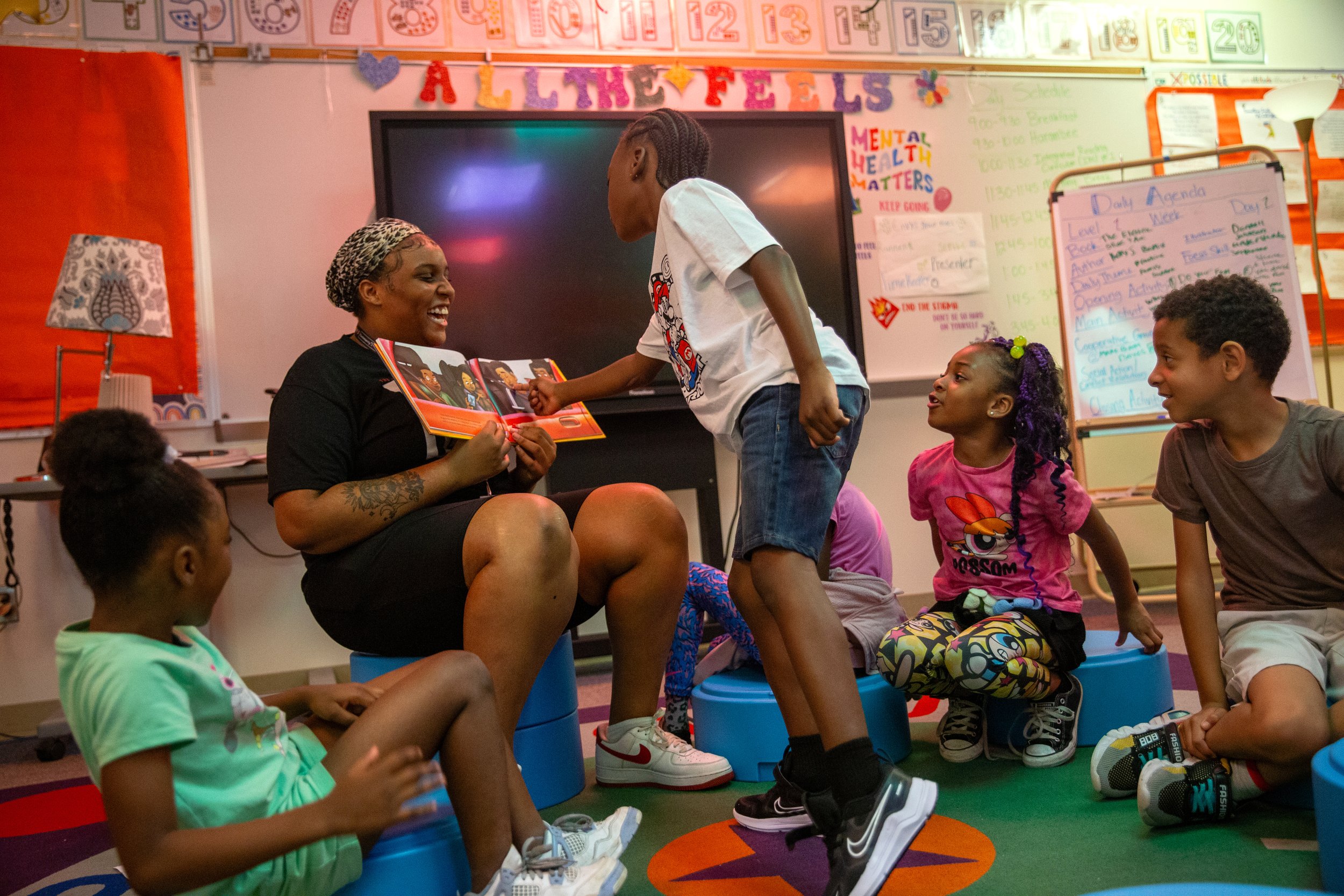Northside Freedom School provides Black history lessons missing from public schools
Brother Ghana Mbaye has been teaching the principles of African drum once a week at Freedom Schools for the past two decades. This component of Freedom School connects students with the culture of the African diaspora and teaches lessons on discipline and respect. Photo by Azhae’la Hanson
By Angeline Patrick Pacheco and Azhae’la Hanson, North News
Shamara Butler was surrounded by giggling children copying her every move.
She held her chin high, her posture straight and proud, her arms rising to the position of strength. Little hands followed suit and poked and prodded at each other's muscles. Some wanted to show Butler how strong they were.
Butler sang to her scholars.
“The higher you build your barriers. The taller I become. The further you take my rights away, the faster I will run. You can deny me, You can decide to turn your face away, No matter, 'cause there's....”Something inside so strong.”
More than 200 children in the Nellie Stone Johnson School gymnasium joined their teachers in song. This is Harambe, a Kiswahili word for “Let’s Pull Together.”
This is the start of every day at Freedom School.
During morning Harambe, kids rushed to their teacher, Shamara Butler, and danced. Photo by Azhae’la Hanson
Freedom Schools have been around for many decades. The schools grew out of the Civil Rights movement in 1964 to provide African-American children with a culturally relevant curriculum centered on literacy, history, and social action.
They’re especially critical now that conservatives, led by President Donald Trump are scrubbing contributions of pioneering African Americans from government websites, museums and national parks.
“What Trump is doing is trying to erase us, and that's a formal attack on Black people,” William Baker, a program coordinator, said. “And so that's an attack on Freedom Schools. I can’t imagine the consequences for youth if he’s successful.”
For seven weeks at Nellie Stone Johnson this summer, kids K-12 learn about liberation through education in classes that focus on community, center their identity and give them tools and confidence to succeed.
“In real school, they don’t really teach you every day about Black history. In Freedom School, you learn about it every day,” fifth-grader Keari Stafford said.
A classroom spent part of the day working on a project where scholars could draw portraits of people that mattered to them. They presented friends, civil rights activists, and family members who passed away. Photo by Azhae’la Hanson
Freedom School aims to fill the gaps in American education that largely minimize the struggles of African Americans and gloss over their achievements. It also develops a curriculum that caters to the different ways children learn and establishes positive reinforcement for Black children.
“We don't have to do everything in a normal fashion. We can sing, we can dance, we can rap, we can write,” said Butler, who attended Freedom School as a child. “(Freedom School) helped me feel affirmed in who I was as a black girl, and I've carried those affirmations throughout my life, constantly being reminded that I'm powerful, that I'm beautiful, that my hair is gorgeous, no matter the texture.”
This year, high school students are part of the program at Nellie Stone Johnson. The casual and safe environment, built through classroom engagement, provides students with a balance of structure and autonomy, focusing on teaching essential life skills. Topics range from financial literacy to the everyday struggles of a teenager.
Kori Randle, left, sat back and observed his high school scholars after a demonstration in seasoning chicken. Photo by Azhae’la Hanson
“It's hard for teenagers to be happy, Anisa Raheem, a high school scholar, said. “In our generation, it’s really hard to experience joy without someone trying to dampen it. Freedom School does a good job at making people feel like they can be who they are. “We have good conversations about the struggles of being a teenager, body issues and peer pressure, self-confidence and how to choose your goals.”
While Freedom School’s curriculum and structure are different from public school, it’s been clear that the positive impact it has on students, said Leavon Fields, site coordinator. He has been working with Freedom School for 24 years.
When a scholar makes a mistake, that’s all it is. Through the eyes of every staff member, every scholar is redeemable and conflicts come and go fast with remediation and redemption.
During integrated reading time in Antaella Lymas’s class, scholars would point to the character who relates to their own experiences. Photo by Azhae’la Hanson
“It impacts not just their reading - their reading scores skyrocket just from the summer - but also their ability to create friendships, their ability to handle conflict,” Fields said. “A lot of Freedom School is tied into building those conflict resolution skills and talking about social action, so I think that gives them that inspiration to change themselves and to be able to handle situations differently.”
On a recent visit, the book of the day was “The Electric Slide and Kai” by Kelly J. Baptist. It’s about a young boy who got a nickname after finally learning the moves to the famous Black dance. The teacher welcomed cheerful contributions as she read aloud. One would point to the character's hair, coiled and thick, and then point to their head. Others spoke about their nicknames and the dances they knew.
“These kids are responding to these books because they can relate to the diversity in the books,” Fields continued. “How would they respond if they had the same diversity in front of them in the schools?”
Three boys used their free time after making a salad in the cafeteria to make funny faces at each other. Teachers at Freedom School who were once scholars themselves recalled the lifelong friendships they formed while in the program. Photo by Azhae’la Hanson






